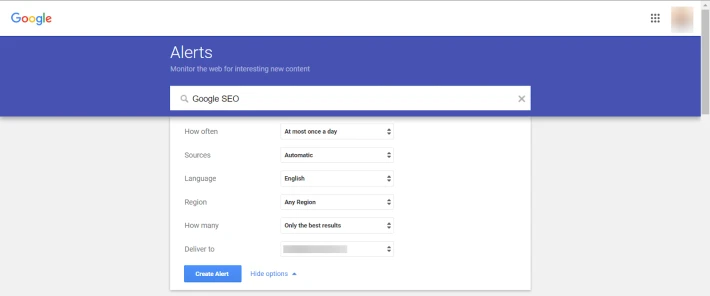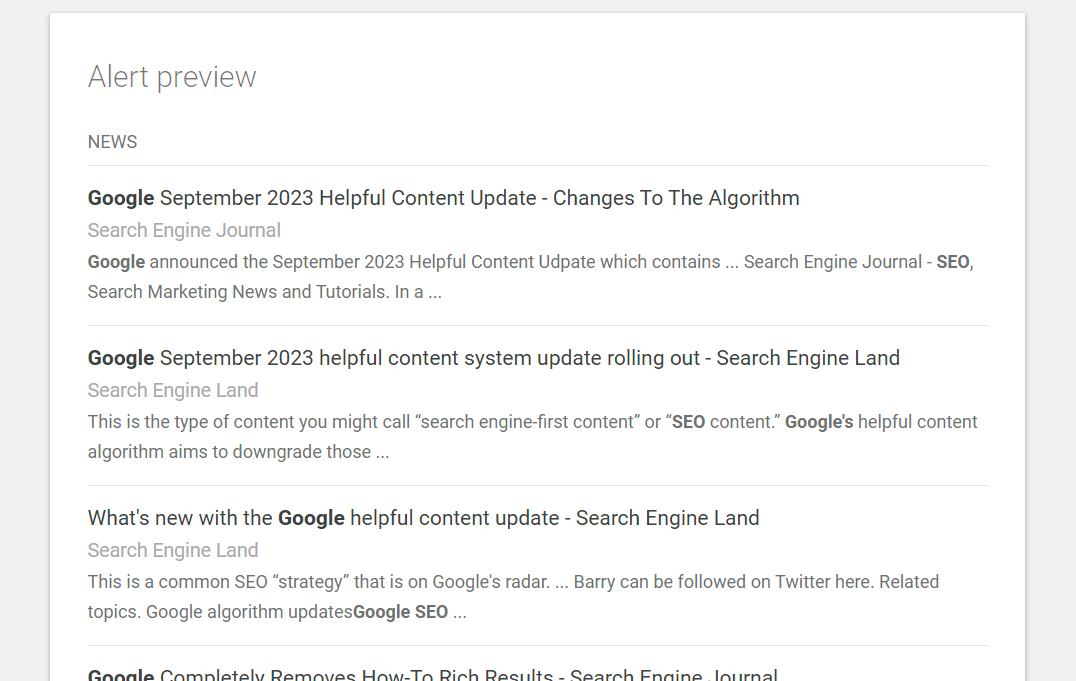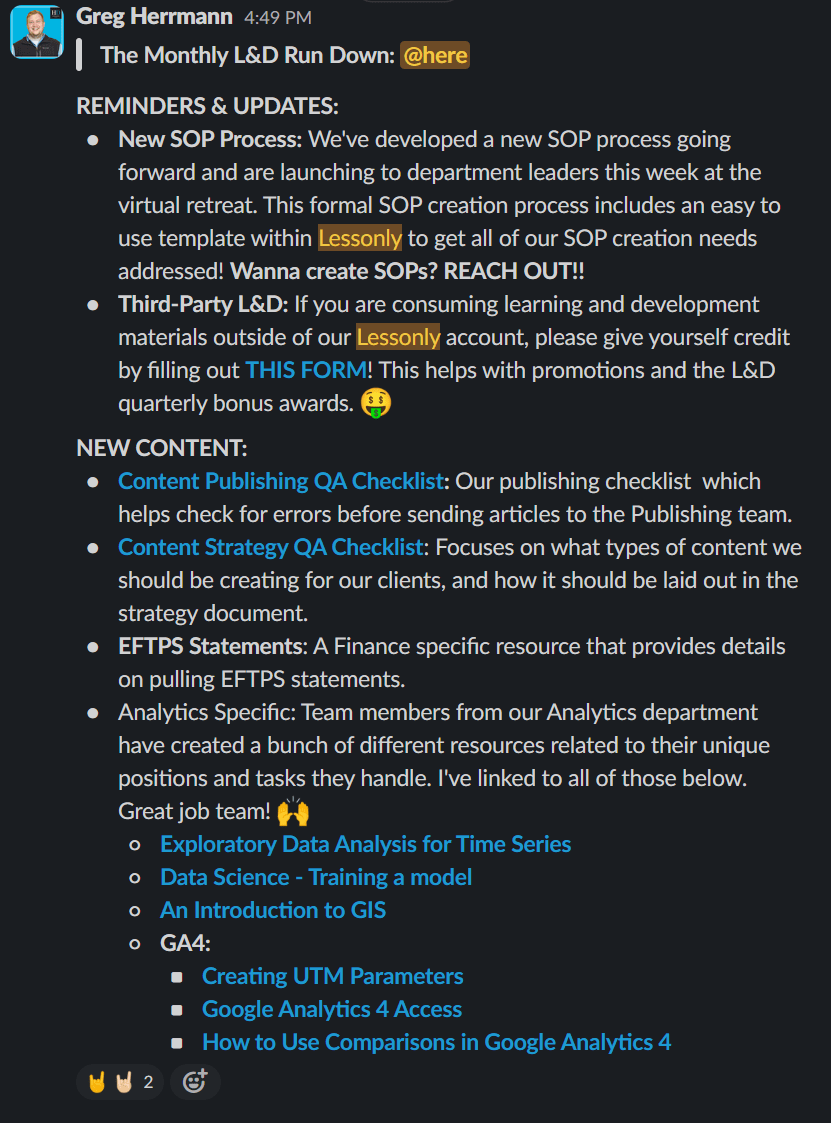Let’s be honest, it isn’t easy creating training around a topic that is always changing. Welcome to our world. As a digital marketing agency, it is imperative for us to keep tabs on all of Google’s updates, the latest digital marketing trends, and the tools we use to ensure that our team members are not only aware of those changes, but also feel equipped and trained before those changes take effect.
So how does the team at Hennessey Digital stay ahead of all the changes that Google throws at us? As the Senior Manager of Learning & Development, I will share a couple of tips on how to incorporate new trends and train your team to stay ahead of the curve.
Understand the Market & Identify Trends to Train On
Before you dive into incorporating the latest digital marketing trends in your learning and development program, you need to identify what trends are going on in the first place. This can be dealt with in a couple of different ways.
You’ll want to identify some sources that help you keep track of the latest trends. Those sources are almost always Google, Microsoft (Bing), or other tools you use for your digital marketing strategy such as Ahrefs, Screaming Frog, STAT, etc. Many, if not all, of these tools have marketing newsletters and email alerts that you can subscribe to.

Additionally, you can utilize an alert system like Google Alerts, where you tell Google what you want to be kept in the loop about, and Google will send alerts to your email. Another great source directly from Google, albeit a bit daunting to approach, is the Google Search Central Blog.
Each of these resources are great starting points to stay informed about updates and trends related to digital marketing. But it still produces a large amount of content to weed through to find out what applies to your company. This is where our next step is crucial!
Identify Your Subject Matter Experts
It’s going to take an army to start. Google is a massive brand that is always updating its products and services, from its algorithm which impacts SEO, to Paid Search, Analytics, and even its consumer products like Chrome or VPN. Admittedly, I am not an expert on anything SEO-related, although I’ve learned a lot through my peers. At Hennessey Digital we specifically hire individuals for our digital marketing teams who are true subject matter experts (SMEs) – those who eat, sleep, and bleed their specialties. Having multiple experts, perspectives, and opinions will help you form a solid training that accounts for everything.
Ideally, within your organization, you may hear about the latest trends and updates from your subject matter experts. They may be your department team leads, managers, or directors. They could even be some of your individual contributors in non-people managing roles. Connect with these individuals when something is coming down the pipeline that you are aware of. Or better yet, set up recurring meetings with these individuals throughout the year to make sure you are on top of industry trends and changes. And when changes do occur, be sure to utilize these people to help update any existing resources or training materials you already have.
Empowering SMEs to Create Impactful Trainings
Once you’ve identified key market trends and identified the SMEs who can help decipher these trends and changes, it’s time to start creating training programs and resource materials.
Here, l, we utilize an internal Learning Management System (LMS). It is always my pleasure to have a subject matter expert raise their hand to create the pieces of training specific to their specialty within our LMS. While this task can be intimidating at first, it’s my job to show that subject matter expert how easy (and important) it is to take an idea and bring it to life in our LMS.
This is where I like to lead by example and conduct a live training “creation meeting” with our subject matter experts. During these meetings, I show them the process of creating a resource or training that provides all the details necessary for effectively educating others and adapting to a new trend or change in the digital marketing landscape.
We take it a step further by providing templates within our LMS that SMEs can select from when creating content. These templates equip creators with everything they need to make a stellar, Hennessey Digital-approved resource or training. Then, all the SME needs to do is fill in the blanks and get that information approved before we launch it live to the eyes and ears of our fellow team members.
Announce & Reiterate
Now that you’ve created an exceptional resource or training, you’re eager to make it accessible to everyone. But is there a right way to do this?
In short, yes, there’s a right way – and a wrong way. When it comes to announcing new training or processes, we strive to ensure that the message resonates, and there are various approaches you can take to achieve this. Here’s our approach:
- Multichannel announcements: After the training is approved, we make it a point to announce it through multiple channels. We begin by sharing the news during company or departmental meetings. The choice between department-specific or company-wide announcements depends on the nature of the training. Some are tailored for specific roles or departments, while others benefit the entire company. These initial announcements, whether in department or company meetings, always come with the promise of future live training sessions. We reserve time on our calendars to host separate meetings about significant changes in our processes or in the digital industry that affect our clients or services. This separation is crucial to ensure that the training’s importance is not diluted when combined with broader department or company meetings.
- Global announcements: Following the separate training sessions, we make a global announcement of the resource through our LMS. This means that the team has received a general announcement about the update, attended live training, and now has a resource at their disposal that relates to the update.
- Monthly Updates: To reinforce the message and provide one last reminder about the new trend or update, I send out a monthly message via our internal messaging tool. Within our agency, it goes out on our main Slack channel. This message highlights all the new content we’ve created and added to our LMS in the previous month.
Setup An Audit Program
Now let’s admit, tackling all things digital marketing related can still be a daunting process even with subject matter experts helping you out. Sometimes, critical updates or changes slip through the cracks, including minor alterations such as user interface (UI) updates for a Google tool or the rebranding of a tool or system.
To safeguard yourself from dropping the ball and missing updates, we suggest implementing an L&D audit program. By having a recurring audit program you get buy-in from department leads and SMEs. Audits don’t take place overnight and might require significant time depending on how much content you have to review in your LMS.
I suggest giving yourself 4 weeks for the audit to give everyone ample time amidst their daily responsibilities. Here at Hennessey Digital, we attack this process over the course of a month and have our department leads go through everything related to their specific department. They are required to read through and ensure the content contained within is still relevant. This allows department leads to identify old, outdated content that either needs to be updated or potentially removed entirely. During this process, department leads and SMEs can update anything that needs immediate change. Generally, there shouldn’t be too much to update as long as you are keeping in touch with your department leads and subject matter experts throughout the year.
The L&D Audit process can also unearth gaps in your training where you might be lacking content. From there it’s back to the drawing board with identifying the subject matter experts to help you fill in that gap of content.
Rinse, repeat, and reward!


